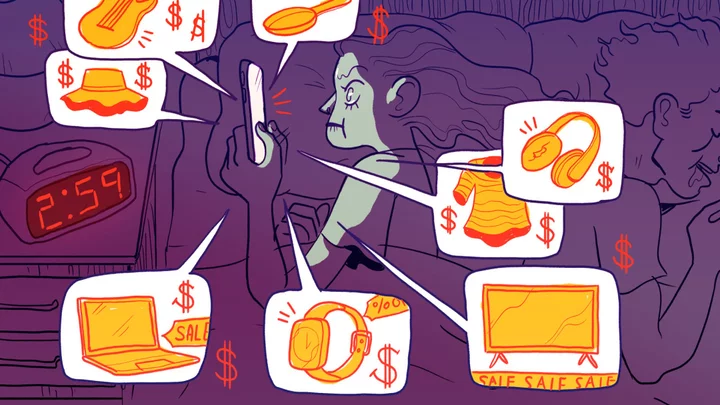With all this talk of deals you should snatch up on Prime Day 2023 — which officially takes place from July 11 through 12 — you may be wondering what to avoid. As it turns out, not every "deal" is actually a deal. And not every deal is actually worth your money (shocker, I know).
It can be difficult to decipher what's worth your hard-earned cash and what's better to pass on. So, we rounded up a list of what not to buy on Prime Day to help you with your shopping experience.
Avoid things sold and shipped from third-parties
It's safest to stick to stuff that's sold and shipped by Amazon, rather than an obscure third-party seller. While the majority of third-party sellers are legitimate, you put yourself at risk buying from an unverified seller or a merchant with little-to-no history.
You can check the seller by navigating to the product page and scrolling just below the "add to cart" button. If it's sold and shipped by Amazon, you're good to go — these are backed by Amazon's policies, making them a safe bet. If it's sold by a third-party seller, but fulfilled by Amazon, you may want to check the reviews of the seller before purchasing. While these fulfilled by Amazon merchants go through a more rigorous vetting process, some can slip through the cracks, so just be cautious. If a product is sold and shipped by a third-party seller, it may be best to avoid it altogether. Amazon doesn't oversee third-party products, so consumers may be out of luck if something goes wrong with an order.
Here's an example of a laptop sold and shipped by Amazon. Credit: Amazon Here's an example of a laptop sold by a third-party seller, but fulfilled by Amazon. Credit: AmazonStay away from Ring deals
While you may be tempted by the monstrous collection of Ring deals on (and leading up to) Prime Day, we do not recommend any of the brand's home security equipment. If you like your privacy (and your neighbors), Ring is a brand to steer clear of. Not only did Amazon (which owns Ring) admit in July 2022 that it's still giving away users' recordings without their permission for "emergency requests," but they can also be used to look inside your home and harass your children, are easily hackable, and can be inappropriately accessed by Amazon employees. To quote the great Randy Jackson, "It's a no from me, dawg."
Hold off on most toys and gaming consoles
If you can, you're better off waiting to purchase most toys and gaming consoles until Black Friday. In the past, we've seen much better deals on toys and gaming consoles (like Xbox Series S bundles) during the holiday season rather than Prime Day. The only exception to this rule — that we've seen so far — is the PlayStation 5 'God of War Ragnarök' Bundle. Ahead of the big day, the bundle has been $60 off at Amazon, which is a huge steal.
Anything that seems too good to be true...probably is
Prime Day always generates some great deals — particularly on Amazon-branded products and services — but if you see a deal that appears too good to be true, chances are it is. How can you tell if a deal is legitimate? Compare prices on other retail sites like Walmart, Best Buy, and Target. Aside from Amazon-specific products, you'll likely be able to find most products on other sites and get an idea of what the regular retail price is. You can also cross-check prices using camelcamelcamel by plugging in the Amazon URL. You'll be able to see the product's price over the past weeks/months/years and get a good idea of whether or not a discount you see is actually as impressive as it seems.
Take this Rockland Melbourne luggage set for example. It's currently listed at $105.91 with a $340 MSRP, making it appear as a 69% discount.
At first glance, a 69% discount seems like a total steal. Credit: AmazonUnfortunately, when you plug the URL into camelcamelcamel, you'll see that the MSRP is inflated and that the sale price isn't as good as it seems. In fact, in the past year, the price has generally hovered around the $100 to $150 point and dropped all the way down to $69.24. That puts more perspective on the $105.91 price tag.
This is what an inflated MSRP will look like when you plug the URL into camelcamelcamel. Credit: CamelCamelCamelAside from inflated MSRPs, some deals may seem like stellar discounts but have actually been hovering at the same price point for weeks (months, even). Check out these discounted AirPods Pro (2nd gen), for example. At $199 (reg. $249), they seem like a great deal, right? While not a bad deal, necessarily, camelcamelcamel shows us that they're regularly discounted to this price, so there's no need to jump the gun.
The $199 price tag isn't so great once you see the history. Credit: CamelCamelCamelBeware of impulse buys
Just because something is on sale doesn't mean you need to buy it. Seriously. Yes, those smart home deals are pretty dang tempting, but do you really need another Alexa-enabled speaker? Sure, FOMO is real, but so is buyer's remorse. In fact, nine out of 10 say they experience buyer's remorse from impulse purchases, according to this Google survey from May — while 42 percent say they've bought something because it was on sale, then later regretted it. Be careful out there, folks.









